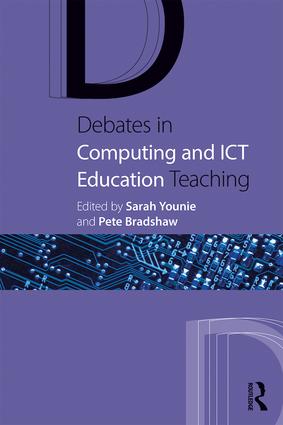Book review: Debates in Computing and ICT Education edited by Sarah Younie and Pete Bradshaw
by Christina Preston. 7 Dec 2017
 Ed. Younie, S. and Bradshaw, P., 2017.
Ed. Younie, S. and Bradshaw, P., 2017.
Debates in Computing and ICT Education
Routledge.
URL: https://www.routledge.com/Debates-in-Computing-and-ICT-Education/Younie-Bradshaw/p/book/9781138891784
Debates in ICT and Computing Education explores the major issues teachers encounter in their daily professional lives. The book encourages critical reflection and aims to stimulate both novice and experienced teachers to think more deeply about their practice, and link research and evidence to what they have observed in schools. The overall aim is to enable teachers to reach informed judgements and argue their point of view with deeper theoretical knowledge and understanding.
This debates book is a companion to the Routledge series, Learning to Teach with Information and Communications Technology (ICT) books that have been edited by our MirandaNet members, Marilyn Leask and Sarah Younie. New revised editions of this series have been published frequently over the last twenty years as the ICT landscape changes. Indeed, computing science has now been added to the mix to pick up the changes made in 2012. The arguments present key themes that are important for our understanding of education futures.
Whereas writing fiction is usually the creative task of one author, a factual book like this requires a different approach. To covers the full range of what is happening in classrooms at this point in time could not, arguably, be written by one professional. But belonging to a professional community seems to matter as well. MirandaNet members make up two thirds of the chapter authors, often working together on tackling established and contemporary issues. For example, Leon Cych, Lawrence Williams and Sarah Younie submitted Using Web 2.00 technologies to enhance teaching and learning subject matter that they had previously presented to a MirandaNet audience and refined. Another example is Towards tomorrow’s successful digital citizens: providing the critical opportunities to change mindsets. This chapter by myself, Moira Savage, Malcolm Payton and Antony Barnett, pulls together MirandaNet and ITTE’s members views on the topic shared in a MirandaMod event where we aim to create new knowledge by collating together the strands of our colleagues unique expertise.
The reason for looking at the authorship of the debates book in this way is to celebrate the role of professional organisations in nurturing members’ writing abilities, providing opportunities to publish and often raising members’ confidence in their publishing potential. We have generally all meet in conference and in the general activities of a professional organisation over many years. This is not the same kind of knowledge that is delivered by the conference circuit gurus who charge high fees to dominate a platform about their latest theories: they are often loners who arrive only to speak and leave without making contact with the delegates. This kind of edited book reflects a different approach to sharing knowledge fellowships over many years and encouraging helpful critique that makes the collaborative knowledge inside the covers worth more than gold.
The book has been divided into three parts: curriculum developments; whole school learning environments; and, classroom applications. Debates include: teacherless classrooms; personalised learning; creativity; digital literacy; visual literacy; e-tools; learning platforms; and opportunities for lifelong learning.
Every reader will find chapters that stimulate and delight. I will just pick out three authors. Firstly, in What can technology do? Chris Shelton expertly summarises the major debates and assumptions that are current in the profession today. These abstractions will help teachers to frame their arguments. In Computer studies, information technology, ICT and now computing John Woollard provides an expert critique of the way in which Computing has been introduced. Although the UK was praised widely abroad for focusing students on how technology works, John expresses concerns that the curriculum no longer offers idea about how society should exploit technology or to promote its value in lifelong learning, citizenship of community action. He fears that as a result of this short-sightedness we will be producing a generation of young people with no formal understanding of the values and affordances of technology in much of their education. How will this serve them in life? Some of these issues are tackled in another outstanding chapters by the editors, Understanding online ethics and digital identities Sarah Younie and Pete Bradshaw navigate a difficult subject avoiding scaremongering and providing positive solutions. Most of all they advocate managing risk and modelling good behaviours online rather than avoiding all the issues through lock-down.
Any professional, whichever discipline they favour, will find much richness in this book because the authors are not afraid to confront the realities of teaching about Computing and ICT in a challenging climate.
